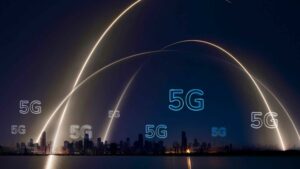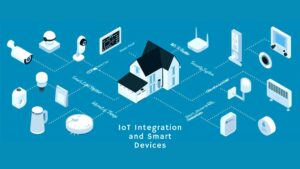Introduction
With the advent of 5G technology, the landscape of mobile app development in India is poised for a significant transformation. As the fifth generation of cellular networks promises unparalleled speed, reliability, and connectivity, its impact on mobile app development cannot be overstated. In this comprehensive guide, we’ll explore the various ways in which 5G is revolutionizing mobile app development in India and shaping the future of the industry.

-
Enhanced Performance and Speed
With the advent of 5G technology, mobile app developers are poised to unlock unprecedented levels of performance and speed in their applications. 5G networks offer blazing-fast download and upload speeds, significantly reducing latency and enhancing overall app performance. This means that users can enjoy smoother and more responsive experiences when interacting with mobile apps, whether they’re streaming content, playing games, or engaging with augmented reality (AR) and virtual reality (VR) applications.

Additionally, real-time streaming and gaming experiences are set to reach new heights with 5G. The ultra-fast speeds and low latency of 5G networks enable seamless real-time interactions and minimal buffering, allowing users to enjoy immersive entertainment experiences without interruptions. Whether it’s streaming high-definition video content or engaging in multiplayer gaming sessions, 5G opens up new possibilities for mobile app developers to create compelling and engaging experiences for their users.
Moreover, 5G technology facilitates improved AR and VR experiences by providing the high bandwidth and low latency required for seamless immersion. With 5G, mobile app developers can leverage AR and VR technologies to deliver more realistic and immersive experiences, whether it’s exploring virtual environments, interacting with virtual objects, or participating in immersive storytelling experiences. As 5G continues to roll out across the globe, the possibilities for enhancing performance and speed in mobile apps are virtually limitless.
-
IoT Integration and Smart Devices

- IoT Connectivity and Interoperability:
5G facilitates seamless connectivity between Internet of Things (IoT) devices, allowing for efficient data exchange and interoperability.
- Smart Home and Automation:
Mobile app developers can leverage 5G to create innovative smart home and automation solutions, enabling users to control and monitor their connected devices remotely.
- Industrial IoT and Smart Cities:
5G-powered IoT solutions are driving advancements in industrial automation and smart city initiatives, leading to more efficient operations and improved quality of life.
-
Edge Computing and Cloud Services
- Edge Computing for Low-Latency Applications:
5G enables edge computing capabilities, allowing mobile apps to offload processing tasks to edge servers for reduced latency and improved performance.
- Cloud-Based Services and Scalability:
Mobile app developers can harness the power of cloud services over 5G networks to build scalable and cost-effective solutions that can handle large volumes of data and users.
- AI and Machine Learning Integration:
With 5G and cloud computing, mobile apps can leverage artificial intelligence (AI) and machine learning (ML) algorithms for real-time data analysis and personalized experiences.
-
Security and Privacy Concerns

-
Network Vulnerabilities and Cyber Threats:
As 5G networks become more prevalent, mobile app developers must address new security challenges, such as increased exposure to cyber threats and vulnerabilities.
-
Data Privacy and Compliance:
With the proliferation of data-intensive applications over 5G, ensuring data privacy and compliance with regulations like GDPR becomes paramount for mobile app developers.
-
Secure Authentication and Authorization:
Implementing robust authentication and authorization mechanisms is essential to protect sensitive user data and prevent unauthorized access to mobile apps.
-
Emerging Technologies and Innovation

-
5G and Wearable Devices:
The combination of 5G and wearable devices revolutionizes the landscape of health, fitness, and wellness applications, offering unprecedented opportunities for mobile app developers. With the high-speed, low-latency connectivity of 5G networks, wearable devices can seamlessly transmit large volumes of data in real-time, enabling more accurate and responsive monitoring of various health metrics. This real-time data transmission facilitates the development of innovative applications that provide users with instant feedback on their health and fitness activities.
Mobile app developers can leverage the capabilities of 5G and wearable devices to create applications that offer personalized insights and recommendations based on real-time data. For example, fitness apps can track users’ exercise routines, heart rate, and sleep patterns, providing personalized workout plans and nutrition advice tailored to individual goals and preferences. Similarly, wellness apps can monitor users’ stress levels, breathing patterns, and mental well-being, offering guided meditation sessions and relaxation techniques to promote mental health and mindfulness.
Furthermore, the low-latency connectivity of 5G networks enables wearable devices to communicate with each other and with other smart devices in the user’s environment, facilitating seamless integration and interoperability. For instance, wearable fitness trackers can sync data with smartphones, smartwatches, and other devices to provide a comprehensive overview of users’ health and fitness metrics across multiple platforms. This interoperability allows users to access their data from anywhere, anytime, empowering them to make informed decisions about their health and well-being.
Overall, the combination of 5G and wearable devices unlocks endless possibilities for mobile app developers to create innovative health, fitness, and wellness applications that deliver real-time monitoring and feedback. By harnessing the power of high-speed connectivity and wearable technology, developers can revolutionize the way users track, manage, and improve their health and well-being.
-
5G and Autonomous Vehicles:
Mobile apps leveraging 5G connectivity play a crucial role in enhancing the functionality and safety of autonomous vehicles by providing a wide range of features and capabilities. With the ultra-fast speeds and low latency of 5G networks, mobile apps can deliver real-time navigation and traffic updates to autonomous vehicles, enabling them to make informed decisions and navigate efficiently through complex road conditions.
One key aspect where 5G-enabled mobile apps excel is in facilitating vehicle-to-vehicle (V2V) communication. By leveraging 5G connectivity, autonomous vehicles can communicate with each other in real-time, sharing critical information such as location, speed, and road conditions. This V2V communication enables vehicles to cooperate and coordinate their movements, reducing the risk of accidents and improving overall traffic flow. Moreover, 5G-enabled mobile apps can enhance the safety and security of autonomous vehicles by providing advanced driver assistance systems (ADAS) features. These features leverage the high-speed connectivity of 5G networks to deliver real-time alerts and warnings to drivers, helping them avoid potential hazards and obstacles on the road. For example, mobile apps can notify drivers of nearby pedestrians, cyclists, or other vehicles, allowing them to take evasive action if necessary.
-
5G and Remote Work Solutions:
With the rise of remote work, mobile app developers have a unique opportunity to leverage the capabilities of 5G technology to revolutionize the way people collaborate, communicate, and work together. By harnessing the ultra-fast speeds, low latency, and high bandwidth of 5G networks, developers can create innovative mobile apps that facilitate seamless connectivity and enhance productivity for remote workers.
One area where 5G technology can make a significant impact is in the development of collaborative tools and platforms. With 5G-enabled mobile apps, remote teams can collaborate in real-time, sharing documents, files, and ideas instantly from anywhere in the world. These apps can offer features such as cloud-based document editing, live chat, and project management tools, enabling teams to work together efficiently and effectively, regardless of their physical location.
Moreover, 5G technology opens up new possibilities for the development of advanced video conferencing platforms. With 5G-enabled mobile apps, remote workers can participate in high-definition video conferences with crystal-clear audio and smooth, lag-free video streaming. These apps can support virtual meetings with large numbers of participants, interactive presentations, and screen sharing capabilities, allowing teams to communicate and collaborate effectively, even when they’re miles apart. In addition to collaborative tools and video conferencing platforms, 5G technology also enables the creation of virtual office environments that replicate the experience of working together in a physical office space. With 5G-enabled mobile apps, remote workers can access virtual offices equipped with virtual meeting rooms, digital whiteboards, and interactive 3D workspaces. These virtual environments foster collaboration, creativity, and team cohesion, providing remote workers with a sense of belonging and connection to their colleagues.
-
Enhanced Connectivity and Network Reliability
In an increasingly interconnected world, where seamless connectivity is paramount, the emergence of 5G technology marks a significant milestone. With its promise of ultra-fast speeds and reduced latency, 5G networks are poised to revolutionize the way we interact with mobile apps. This newfound connectivity not only ensures smoother and more responsive app experiences but also lays the foundation for a more connected future. As mobile app developers harness the power of 5G, they can leverage its enhanced connectivity and network reliability to create innovative solutions that push the boundaries of what’s possible in the realm of mobile technology.
-
Scalability and Future-Proofing
As the digital landscape continues to evolve at a rapid pace, scalability and future-proofing have become critical considerations for mobile app developers. With the advent of 5G technology, developers are presented with a unique opportunity to build applications that are not only feature-rich and innovative but also scalable and future-proof. By leveraging the scalability of 5G infrastructure, developers can ensure that their applications can seamlessly adapt to increasing user demands and evolving technology trends. Additionally, by future-proofing their investments with 5G, developers can position their applications for long-term success in an ever-changing digital ecosystem.
Conclusion
As 5G technology gains momentum in India, the demand for top-notch mobile app developers is on the rise. With our custom software and application development services, businesses can hire skilled professionals in India to leverage the power of 5G and create innovative mobile solutions tailored to their unique needs.
5G technology enables deeper integration with the Internet of Things (IoT), paving the way for a new generation of connected devices and applications. Mobile app developers can leverage 5G networks to build IoT-powered solutions that connect and control smart devices, sensors, and wearables, enabling seamless automation, monitoring, and data collection across various industries. From smart home systems and connected cars to industrial IoT applications, the possibilities for innovation are virtually limitless with 5G-enabled IoT solutions.
However, along with its many benefits, the widespread adoption of 5G technology also brings new challenges and considerations, particularly in terms of security. As mobile app developers harness the power of 5G networks to deliver more data-intensive and interconnected applications, they must prioritize security and privacy measures to protect user data and ensure the integrity of their applications. This includes implementing robust encryption protocols, authentication mechanisms, and secure coding practices to mitigate the risk of cyber threats and data breaches.
In this rapidly evolving landscape, mobile app developers must stay abreast of the latest developments in 5G technology and adapt their strategies accordingly. By embracing the capabilities of 5G networks and leveraging emerging technologies such as AI, machine learning, and augmented reality, developers can create innovative and compelling mobile applications that push the boundaries of what’s possible. As the demand for top-notch app development services in India continues to rise, businesses can turn to reputable agencies like ours to hire mobile app developers who possess the expertise and experience to deliver custom software and application development services tailored to their unique needs. With our team of skilled professionals, we’re committed to helping businesses harness the full potential of 5G technology and drive digital transformation in the mobile app landscape.
Wrapping Up
At Zonvoir Technologies, we’re at the forefront of mobile app development in India, harnessing the power of 5G technology to create cutting-edge solutions that drive business growth and innovation. Contact us today to explore how we can help you unlock the full potential of 5G for your mobile app projects.





Leave a Reply